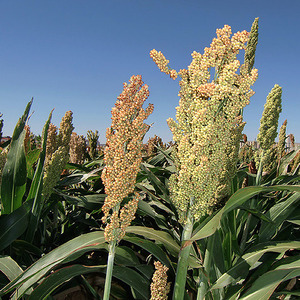Comment period open on proposed discretionary changes to BCAP

USDA Agricultural Research Service
June 15, 2015
BY Erin Krueger
The USDA has announced its intent to prepare a programmatic environmental impact statement (PEIS) to assess the potential environmental consequences associated with proposed discretionary changes to the Biomass Crop Assistance Program. A public comment period on the matter is now open.
According to a notice posted in the Federal Register, the USDA’s Farm Service Agency will prepare the PEIS on behalf of the Commodity Credit Corp. The notice informs the public of FSA’s intent to seek public comment on potential changes being considered for BCAP and on environmental concerns related to the proposed changes. Preparation of the PEIS is required by the National Environmental Policy Act of 1969. The USDA indicated the input it receives as part of the notice will enable the development of alternatives for implementing the proposed changes to BCAP and begin to evaluate the impacts of those alternatives, as required by NEPA.
The notice explains that the purpose of the PEIS process is to provide FSA decision makers, other agencies, tribes and the public with an analysis of the potential beneficial, adverse, and cumulative environmental impacts associated with proposed discretionary changes to BCAP.
In 2010, a final PEIS for BCAP was published by the FSA. According to the notice, that PEIS evaluated environmental consequences of establishing and administering the BCAP as specified in the 2008 Farm Bill. Since 2010, environmental assessments have been prepared for various project areas and for specific feedstocks.
Advertisement
Advertisement
The 2014 Farm Bill amended and reauthorized BCAP through 2018. According to the notice, the 2014 Farm Bill included a number of non-discretionary changes to the program. Those changes are primarily administrative in nature, do not alter the general scope of the program, and have already been implemented through rulemaking.
The notice explains the FSA is currently considering discretionary changes to the way BCAP is implemented. Those discretionary changes define the scope for the new PEIS.
According to the notice, the proposed discretionary changes aim to improve the functionality and flexibility of the establishment and annual payments as part of BCAP. No discretionary changes are being proposed for the matching payments part of BCAP.
The proposed changes include consideration and review of additional crops, such as pongamia pinnata, giant miscanthus seeded and rhizome clones, giant reed, pennycress, energy cane, biomass sorghum, sweet sorghum, yellowhorned fruit tree, eastern cottonwood, kenaf, jatropha, eucalyptus (fast growing), castor beans, short-rotation pine, tropical maze, hybrid willow, sweetgum, black locust, loblolly pine, aspen, rubber rabbitbrush, and guayule.
A separate proposed change would add requirements or additional practices for conservation plans on expiring conservation reserve program (CRP) or agricultural conservation easement program (ACEP) land acres that would be enrolled in BCAP project areas.
Advertisement
Advertisement
In addition, the notice includes the potential for enrolling annual crops in BCAP project areas for contracts of less than five years.
Additional proposed changes would establish program management processes that could help offset the lack of crop insurance for biomass crops or provide sufficient information for the Noninsured Crop Disaster Assistance Program to establish coverage, and would address treatment of the required FSA annual rental reductions in the event of no bioenergy market and use for the harvested or collected biomass crops.
According to information published in the notice, the FSA plans to hold a series of scoping meetings to provide information on the proposed changes to BCAP and solicit input from program participants, the public and other stakeholders on the environmental impacts of the proposed changes and alternatives to the proposed changes. Meetings are scheduled to be held July 14 in Sacramento, California; July 15 in Honolulu; Aug. 3 in Raleigh, North Carolina; Aug. 4 in Orlando, Florida; and Aug. 5 in Sioux City, Iowa.
Comments on the proposed discretionary changes are due July 13. An additional opportunities for public comment will be available on the PEIS when it is developed. Additional information is available in the Federal Register notice.
Related Stories
The U.S. EPA on July 8 hosted virtual public hearing to gather input on the agency’s recently released proposed rule to set 2026 and 2027 RFS RVOs. Members of the biofuel industry were among those to offer testimony during the event.
The USDA’s Risk Management Agency is implementing multiple changes to the Camelina pilot insurance program for the 2026 and succeeding crop years. The changes will expand coverage options and provide greater flexibility for producers.
EcoCeres Inc. has signed a multi-year agreement to supply British Airways with sustainable aviation fuel (SAF). The fuel will be produced from 100% waste-based biomass feedstock, such as used cooking oil (UCO).
President Trump on July 4 signed the “One Big Beautiful Bill Act.” The legislation extends and updates the 45Z credit and revives a tax credit benefiting small biodiesel producers but repeals several other bioenergy-related tax incentives.
CARB on June 27 announced amendments to the state’s LCFS regulations will take effect beginning on July 1. The amended regulations were approved by the agency in November 2024, but implementation was delayed due to regulatory clarity issues.
Upcoming Events










